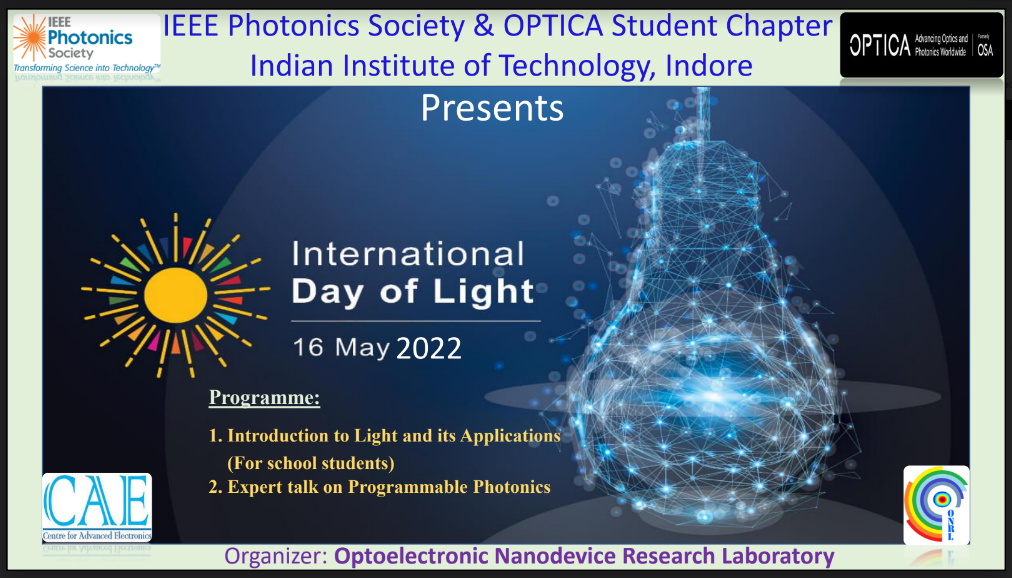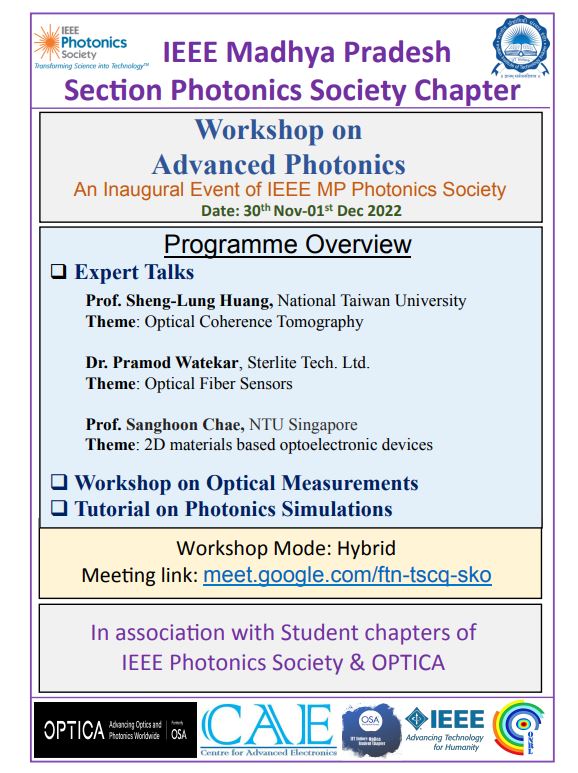Transitioning from Academia to Industry session by Dr. Payel Das


In today’s data-hungry world, with the ever-increasing demand for reducing the size, weight, and power consumption, the research community is rapidly shifting its focus towards Integrated Photonics. Integrated Photonics (IP) uses light as a carrier which enjoys various advantages as compared to its electronic counterpart. It finds applications in a wide variety of areas including telecommunications such as 5G networks, biosensors for speeding up medical diagnosis, and in automotive where it is used in LIDAR. IP comprises the integration of multiple photonic functions on a Photonic Integrated Circuit (PIC) fabricated using automated wafer-scale generic integration technology over silicon, silica, or Indium Phosphide (InP) substrates. The motive of this workshop is to enlighten about integrated photonics and its applications in different areas. The workshop also demonstrates the tools used in designing Photonic Integrated Circuits

On 16th May 2022 IEEE Photonics Society held an expert talk on ‘Programmable Photonics’ as part of the international day of light celebration. The speaker of this splendid workshop was Prof. Bijoy K. Das, IIT Madras. He is one of the founding members of the Centre for NEMS and Nanophotonics (CNNP) at IIT Madras and Chief Investigator of the Silicon Photonics Centre of Excellence – Centre for Programmable Photonic Integrated Circuits and Systems (CPPICS), funded by the MeitY, Govt. of India.


With great ecstasy, we would like to invite you to participate in the inaugural event of IEEE Photonics Society Chapter of Madhya Pradesh in association with IIT Indore student chapter of Photonics Society. The event “Workshop on Advanced Photonics” will be organized on November 30 2022 and December 1, 2022 in hybrid mode.
Please write to us if you are interested in participating offline.
The insightful event will be graced by eminent experts from academia and industry. Please see the attached file for the details. Details of the speakers are as follows:
1. Prof. Shen-Lung Huang, National Taiwan University
2. Dr. Pramod Watekar, Sterlite Tech. Ltd.
3. Prof. Sanghoon Chae, NTU Singapore
Please find the attached flyer of the event for more information.
Online link:meet.google.com/ftn-tscq-sko
We look forward to your active participation.
Thanks & Regards,
IEEE Photonics Society Madhya Pradesh,
Photonics Society Student Chapter, IIT Indore
OPTICA Student Chapter, IIT Indore
Dear All,
IEEE GRSS IITI and IEEE SB IITI cordially invites the student community to join for the upcoming Tech Talk series on Dec 7,2022 for an interesting talk by Dr.Zachary Labe on climate model projections and visualizations using Machine Learning.
The details of the Tech-Talks:
Title: Machine learning for evaluating climate model projections
Speaker: Dr.Zachary Labe, Postdoctoral Research Associate at Princeton University and NOAA GFDL,
Date and time:Wednesday Dec 7,2022 18:30 IST (poster attached)
Registration Link: https://iiti.webex.com/weblink/register/r4580ea40572d2f54864c9d034cb97089
Lucky participants would receive IEEE merchandise goodies. Please fill out the feedback form after the webinar to claim this offer (limited to IITI students only)
Kindly find the abstract and speaker bio below for reference.
Abstract : The popularity of machine learning methods, such as neural networks, is rapidly expanding in nearly all areas of science. The interest in these tools also coincides with a growing influx of big data and the need for high efficiency in solving prediction problems. However, there is also some hesitancy in adopting the use of neural networks due to concerns about their reliability, reproducibility, and interpretability.
In climate science, we often consider signal-to-noise problems to help disentangle human- caused climate change from natural variability. These applications typically involve complicated relationships between different feedbacks at play in the ocean, cryosphere, land, and
atmosphere. Recent work has shown that neural networks can be a promising tool for solving these types of statistical problems when combined with explainability techniques developed by the fields of computer science and image processing. Interestingly, these methods have revealed that neural networks often leverage regional patterns of climate change in order to make their predictions. In this webinar, I will share examples from climate science that use a few of these visualization methods to peer into the “black box” of neural networks, which help us to better understand their decision-making process while also learning new science. The same machine learning visualization methods can be easily adapted for a wide variety of applications and other scientific fields of study.
Bio: Dr. Zachary Labe is a postdoc at NOAA’s Geophysical Fluid Dynamics Laboratory and the Atmospheric and Oceanic Sciences Program at Princeton University. His current research interests explore the intersection of climate variability, extreme events, decadal prediction, and explainable machine learning methods. In addition to academic research, he is very passionate about improving science communication, accessibility, and outreach through engaging climate change visualizations.
Dear all,
Greetings from IEEE Student Branch IIT Indore!
The MATLAB workshop is here!
We are glad to announce the workshop on MATLAB by MATHWORKS at IIT Indore. Register now WHILE THE SEATS ARE AVAILABLE if you want to learn about MATLAB, image processing, deep learning, and more. The resources will be provided, and the workshop will be OFFLINE*.
Register Now!
Date: May 5, 2022. Thursday( 10:00 AM to 4:30 PM)Mode: Offline (subjected to change based on covid protocols). The venue will be updated soon.
Since there are a limited number of seats for GPU resources offered by MATHWORKS, we are currently limiting registrations to 40 teams on a first-come, first-serve basis. The registrations will be closed after receiving 40 responses.
For any queries/trouble in filling google form, contact us at ieeesbiiti@iiti.ac.inContact number: +91 7200616617
Dear all,
Greetings and warm welcome from IEEE Student Branch IIT Indore.
IEEE (Institute of Electrical and Electronics Engineers) is a diverse organization, encompassing more than 374,000 members active in almost 40 technical societies.
Many of you had heard of IEEE, and some of you had even attended IEEE conferences and authored papers for IEEE journals. Have you ever explored the perks of being an IEEE member?
Do you know?
Know more about the IEEE membership opportunities by attending an expert session by Dr. Mousiki Kar, senior member of IEEE,chair of IEEE Electronic Devices society, Kolkata Chapter. Also, attend a simple quiz on IEEE and win exciting IEEE merchandise on the day of the event. Do attend, register for the IEEE membership and grab an exclusive IEEE welcome Kit for free.
Date: Feb 5,2022Meeting link: Join the webinar here
Dear Students,
Reserve your dates for a keynote webinar on “Remote Sensing of Ionospheric Perturbations Induced by Earthquakes and Tsunamis Using GNSS” by Dr.Sithartha Muthu Vijayan, senior scientist,CSIR Fourth Paradigm Institute. This talk covers the fundamentals and current status of ionospheric seismology including ionosphere-based tsunami early warning, methods for detecting ionospheric perturbations using GNSS, emerging opportunities, and challenges ahead.
Date/Time:16:00-17:00 IST – Apr 8,2022 (Friday)
Kindly Register here to attend the session.
The lecture is jointly organized by IEEE Geoscience and Remote Sensing (GRSS) chapter IITI and IEEE Student branch,IIT Indore
The details of this Webinar are below :
Title: Remote Sensing of Ionospheric Perturbations Induced by Earthquakes and Tsunamis Using GNSS
Speaker: Dr.Sithartha Muthu Vijayan, senior scientist,CSIR Fourth Paradigm Institute.
Abstract:
It is well-known that acoustic and gravity waves generated by earthquakes and tsunamis grow in amplitude during their vertical propagation in the atmosphere and perturb the ionospheric plasma. However, there were limitations in observing such perturbations using conventional observational techniques. The advent of Global Navigation Satellite Systems (GNSS) changed the scenario. The number of dual-frequency GNSS receivers established – both in space and ground – for various scientific and navigational purposes, and the massive earthquakes and tsunamis that shook the Earth in the last two decades provided an unprecedented opportunity to detect and study the coseismic and tsunamigenic ionospheric perturbations. Eventually, these studies opened up a new area of research called ionospheric seismology. Being in its infancy, ionospheric seismology demands improvements in both theoretical as well as observational research to obtain maturity. Upon its maturity, ionospheric seismology will make the remote sensing of earthquakes and other planetary quakes possible in addition to filling the crucial gaps in conventional seismology. Further, this multidisciplinary research field is opening up many research opportunities in the domains of ionospheric physics, geodesy, and geophysics. This talk covers the fundamentals and current status of ionospheric seismology including ionosphere-based tsunami early warning, methods for detecting ionospheric perturbations using GNSS, emerging opportunities, and challenges ahead.
#4th webinar
Title
Looking at the Sun in the Near-UV range with the Solar Ultraviolet Imaging Telescope onboard Aditya-L1 mission
Speaker
Dr.Avyarthana Ghosh (Postdoc, IUCAA Pune)
IUCAA,Pune.
Abstract:
The Solar Ultraviolet Imaging Telescope (SUIT) on-board Aditya-L1 spacecraft (India’s first space mission dedicated solely to solar observations) is an indigenous effort to observe the Sun in Near-Ultraviolet range of the solar electromagnetic spectrum. It is unique in the way that it can image the Sun 24×7 from the Sun-Earth Lagrangian 1 point with a high spatial resolution, cadence and contrast, in addition to good straylight mitigation. There is a suite of 11 science filters, out of which 8 are with comparatively narrow Full-Width-Half-Maxima and remaining 3 are broadband. In total, these 11 science filters probe the dynamics and coupling of mass and energy in different layers of the lower solar atmosphere as well as its impact on space-terrestrial climate. In my talk, I shall be giving a brief overview of the science objectives, the photometric designing of SUIT along with its performance modelling and straylight estimates. Finally, I shall be talking about the operational planning and the current status of the instrument which is being tested at subsystems- level and assembled.
##3rd webinar
Title
Fiber-optic Biosensors for Water Quality Assessment
Speaker
Dr. Nirmal Punjabi
Project Research Scientist, NCETIS.
Indian Institute of Technology Bombay, India.
Abstract:
Testing of water is an integral component for maintaining water quality and providing drinking water to everyone. Due to the limited accessibility of sophisticated instruments
for organic and inorganic analysis, proper testing is not accessible for everyone. Fiber optic sensors, due to their versatility, are potential solutions for water quality assessment that can be deployed at the broadest scale, thereby making them accessible at remote locations. In this talk, I will be providing an overview of the research in the development of guided-wave absorbance-based fiber-optic sensors and their application for the detection of contaminants in drinking water.
Date and Time: Aug 7, 4-5 pm IST